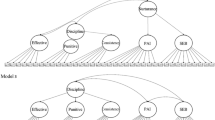Abstract
We compared two common measures of parenting behavior, the Children's Report of Parental Behavior Inventory (CRPBI) and the Parental Bonding Instrument (PBI), evaluating their psychometric properties and predictive ability. One hundred sixty seven college students completed the CRPBI, PBI, and measures of depression and anxiety with 123 participants returning three to six months later for follow-up evaluations. The parenting measures were found to have similar psychometric properties and to be moderately to highly correlated with each other. In addition, both measures were similar in their ability to predict depression and anxiety symptoms, although neither was significantly predictive of actual diagnoses. Given that the PBI is a shorter measure and, based on previous studies, appears to be more stable over time than the CRPBI, there is evidence to suggest that it might be a more useful measure of parenting behavior than the CRPBI.
Similar content being viewed by others
References
Ainsworth, M.D.S., Blehar, M., Waters, E., & Wall, S. (1978). Patterns of attachment: A psychological study of the strange situation. Hillsdale, NJ: Erlbaum.
Alloy, L.B. & Abramson, L.Y. (1999). The Temple-Wisconsin Cognitive Vulnerability to Depression (CVD) project: Conceptual background, design, and methods. Journal of Cognitive Psychotherapy, 13, 227–262.
Alloy, L.B., Abramson, L.Y., Gibb, B.E., Crossfield, A.G., Pieracci, A.,M., Spasojevic, J., & Steinberg, J.A. (2004). Developmental antecedents of cognitive vulnerability to depression: Review of findings from the cognitive vulnerability to depression project. Journal of Cognitive Psychotherapy, 18, 115–133.
Alloy, L.B., Abramson, L.Y., Smith, J.M., Gibb, B.E., & Neeren, A.M. (2006). Role of parenting and maltreatment histories in unipolar and bipolar mood disorders: Mediation by cognitive vulnerability to depression. Clinical Child and Family Psychology Review, 9, 23–64.
American Psychiatric Association. (1994). Diagnostic and statistical manual of mental disorders. (4th. ed.). Washington, DC: Author.
Beck, A.T. (1967). Depression: Clinical, experimental, and theoretical aspects. New York: Harper & Row.
Beck, A.T., Epstein, N., Brown, G., & Steer, R.A. (1988). An inventory for measuring clinical anxiety: Psychometric properties. Journal of Consulting and Clinical Psychology, 56, 893–897.
Beck, A.T., Rush, A.J., Shaw, B.F., & Emery, G. (1979). Cognitive therapy of depression. New York: Guilford Press.
Beck, A.T., Steer, R.A., & Garbin, M.G. (1988). Psychometric properties of the Beck Depression Inventory: Twenty-five years of evaluation. Clinical Psychology Review, 8, 77–100.
Bowlby, J. (1977). The making and breaking of affectional bonds. British Journal of Psychiatry, 130, 201–210.
Cassidy, J. & Shaver, P.R. (1999). Handbook of Attachment: Theory, Research, and Clinical Implications. New York: Guilford.
Fydrich, T., Dowdall, D., & Chambless, D.L. (1992). Reliability and validity of the Beck Anxiety Inventory. Journal of Anxiety Disorders, 6, 55–61.
Gerlsma, C., Emmelkamp, P.M.G., & Arrindell, W.A. (1990). Anxiety, depression, and perception of early parenting: A meta-analysis. Clinical Psychology Review, 10, 251–277.
Gotlib, I.H., Mount, J.H., Cordy, N.I., & Whiffen, V.E. (1988). Depression and perceptions of early parenting: a longitudinal investigation. British Journal of Psychiatry, 152, 24–27.
Lizardi, H. & Klein, D.N (2005). Long-term stability of parental representations in depressed outpatients utilizing the Parental Bonding Instrument. Journal of Nervous and Mental Disease, 193, 183–188.
Margolies, P.J. & Wintraub, S. (1977). The revised 56-item CRPBI as a research instrument: Reliability and factor structure. Journal of Clinical Psychology, 33, 472–476.
Parker, G. (1993). Parental rearing style: Examining for links with personality vulnerability factors for depression. Social Psychiatry and Psychiatric Epidemiology, 28, 97–100.
Parker, G. (1983). Parental overprotection: A risk factor in psychosocial development. New York: Grune & Stratton.
Parker, G. (1981). Parental reports of depressives: An investigation of several explanations. Journal of Affective Disorders, 3, 131–140.
Parker, G. & Lipscombe, P. (1981). Influences on maternal overprotection. British Journal of Psychiatry, 138, 303–311.
Parker, G., Tupling, H. & Brown, L.B. (1979). A parental bonding instrument. British Journal of Medical Psychology, 52, 1–10.
Raskin, A., Boothe, H.H., Reatig, N.A., Schulterbrandt, J.G., & Odle, D. (1971). Factor analysis of normal and depressed patients' memories of parental behavior. Psychological Reports, 29, 871–879.
Schaefer, E.S. (1965a). Children's reports of parental behavior: An inventory. Child Development, 36, 413–424.
Schaefer, E.S. (1965b). A configurational analysis of children's reports of parent behavior. Journal of Consulting Psychology, 29, 552–557.
Schludermann, E. & Schludermann, S. (1970). Replicability of factors in children's report of parent behavior (CRPBI). Journal of Psychology, 76, 239–249.
Spitzer, R.L., & Endicott, J. (1978). Schedule for Affective Disorders and Schizophrenia - Change Version. Biometrics Research, New York State Psychiatric Institute.
Spitzer, R.L., Endicott, J., & Robins, E. (1978). Research diagnostic criteria: Rationale and reliability. Archives of General Psychiatry, 35, 773–782.
Wilhelm, K., Niven, H., & Parker, G. (2005). The stability of the Parental Bonding Instrument over a 20-year period. Psychological Medicine, 35, 387–393.
Author information
Authors and Affiliations
Corresponding author
Rights and permissions
About this article
Cite this article
Safford, S.M., Alloy, L.B. & Pieracci, A. A Comparison of Two Measures of Parental Behavior. J Child Fam Stud 16, 375–384 (2007). https://doi.org/10.1007/s10826-006-9092-3
Published:
Issue Date:
DOI: https://doi.org/10.1007/s10826-006-9092-3




